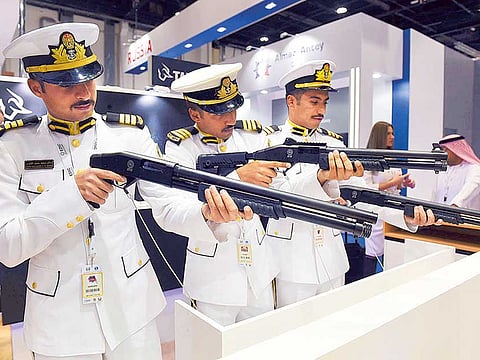Lockheed Martin unveils new machine as they look beyond defence
Vice President admits this isn’t their traditional realm of expertise, but confirms deals have been made

Dubai: US defence and aerospace contractor Lockheed Martin unveiled its latest development in the field of automated machine manufacturing at Idex on Monday morning, telling Gulf News that they had several “confirmed deals” for the new tool.
In the presence of General Manager for the Middle East Robert Harward, who recently declined the role of national security adviser in the US President Donald Trump’s administration, the company revealed its new technology aimed at aerospace and other industries such as oil and gas.
“This isn’t Lockheed Martin’s core technology,” said Darrel Seale, Vice-President, UAE Initiatives at Lockheed Martin, adding that they were focusing more on innovation now than just simply defence.
“My UAE military customer isn’t going to walk up and say ‘this is exactly what I need on my flight line’, so whilst it might not be the product that we’re known for, we think we’re also known for innovation,” said Seale.
He described how Lockheed Martin saw an innovative product and a “strong desire from their partner, the UAE, to “bring new technology to the country and establish local manufacturing”.
“That’s Lockheed Martin’s play in all of this,” the executive added.
The new robotic machine will be manufactured in the UAE, as part of the Tawazun Economic Council offset programme, and in collaboration with the Masdar Institute of Science and Technology.
“We already have confirmed orders, and as we look at the years ahead, we’re expecting hundreds and then thousands a year, across the world in sales,” said Seale.
The first two machines off the production line will go to Masdar.
Speaking about the inherent benefit of growing such capabilities in-house, Stan Ramirez, Vice-President of Industrial Participation and Offsets at Lockheed Martin, said “the ability to produce the kinds of parts we need in our aerospace business, with the kind of precision we need, has been a hugely capital intensive undertaking”, adding that the Xmini allowed them to enter the supply chain at an earlier stage.
Shrugging off concerns about rising import taxes amid a protectionist environment, Ramirez described it as “simply the cost of doing business”.
“The impact is the same as it would be in any industry.”
Described by Seale as an autonomous tool that will be able to do the jobs humans couldn’t, or shouldn’t, do, the Xmini has the capability to make 50mm diameter holes in titanium, a job that would traditionally require a 20-ton machine, sitting on a three-metre foundation.



